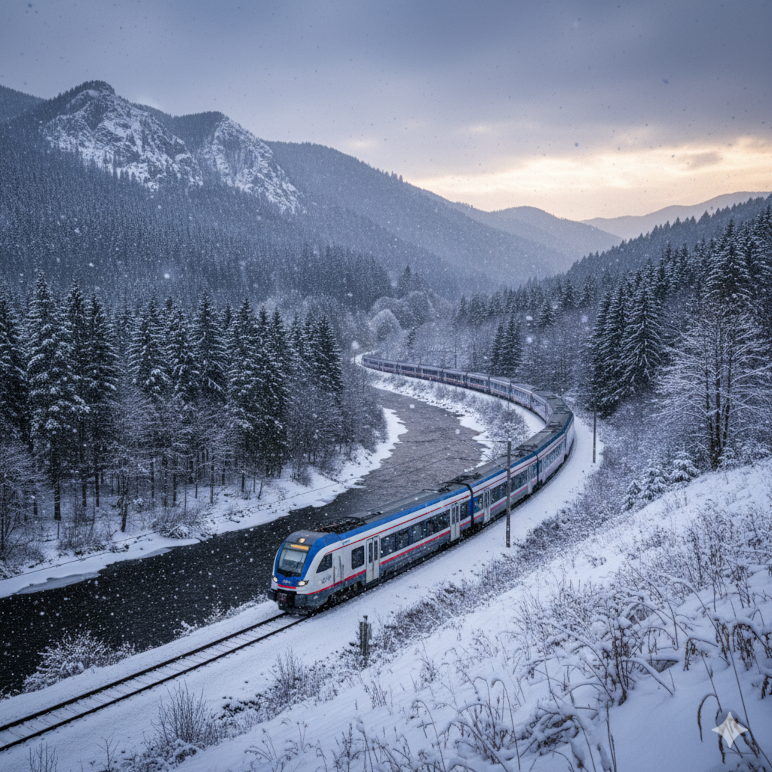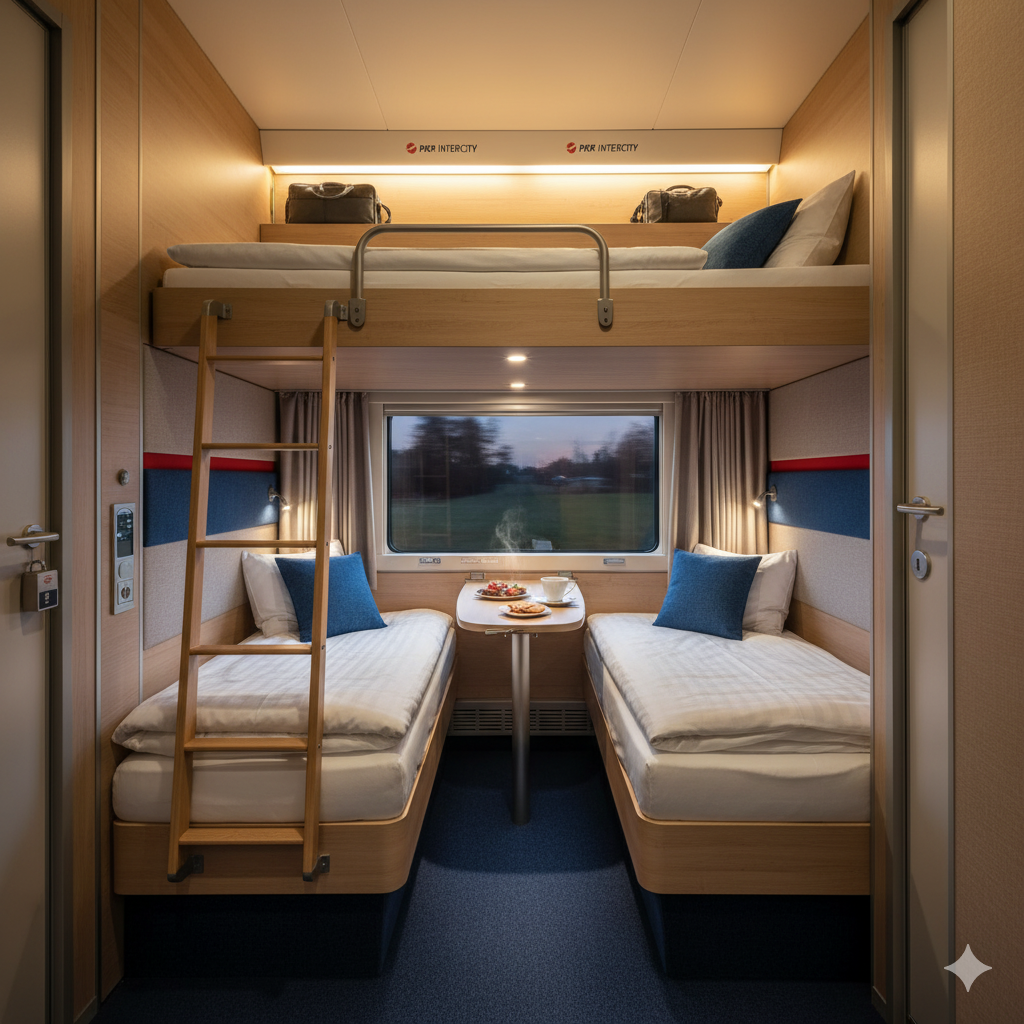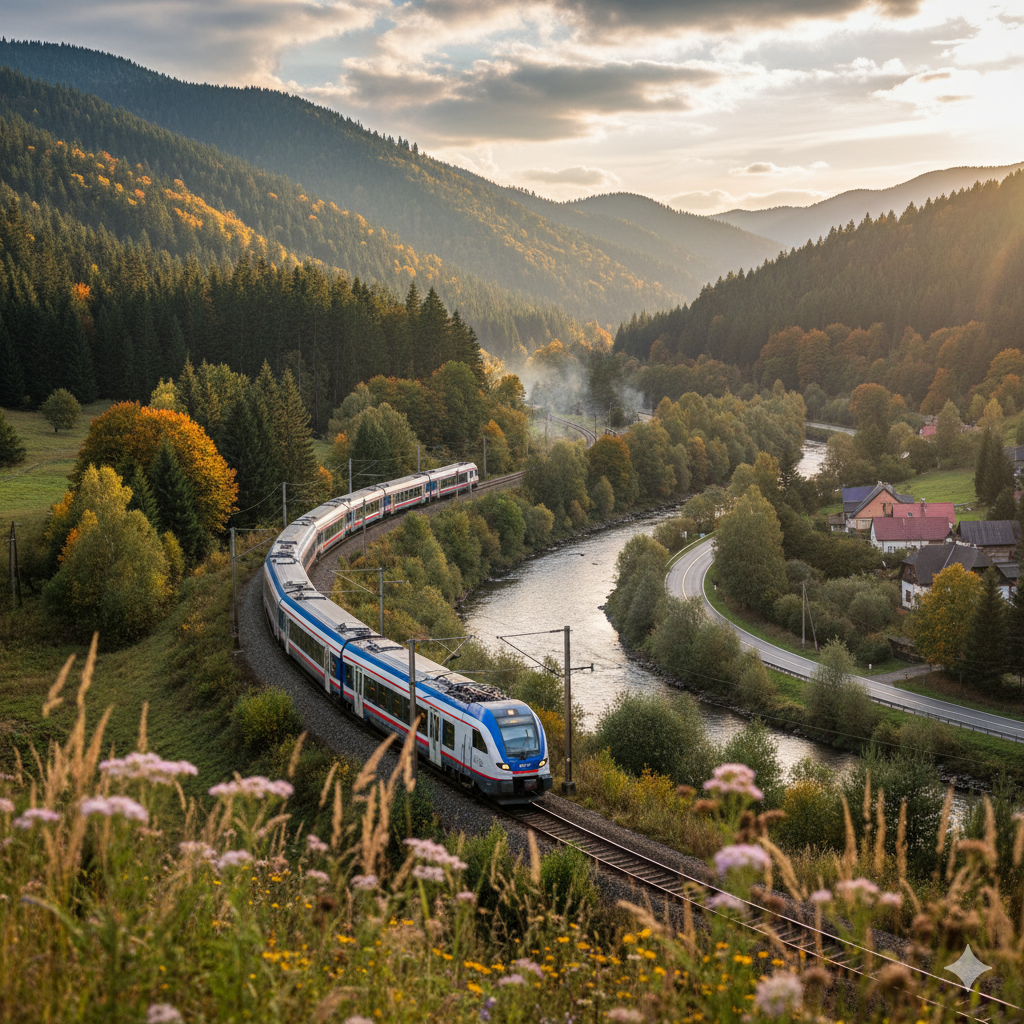From Poland to Munich by Night

From Poland to Munich by Night: Inside the New EN Carpatia Sleeper Train
From Poland to Munich: Europe’s sleeper trains are enjoying a revival. As travellers search for slower, more sustainable ways to explore the continent, rail operators are reopening and expanding their overnight networks. This December, Poland’s national rail company PKP Intercity joins the movement with the EN Carpatia, a new EuroNight sleeper train connecting Poland, Slovakia, Hungary, Austria, and Germany. Launching on 14 December 2025, the service will link Przemyśl in southeastern Poland to Munich, providing a comfortable overnight journey across five Central European countries.
Far from being a nostalgic throwback, the EN Carpatia combines the romance of classic night travel with the comfort and convenience expected by modern passengers. It’s an important step toward restoring rail connections between eastern and western Europe, offering an appealing alternative to flying.
The Concept Behind EN Carpatia
The name “EN Carpatia” comes from the Carpathian Mountains, which stretch across Central and Eastern Europe. The route traces their northern edge, connecting Poland’s cultural centres with Austria’s and Germany’s major cities.
Operated by PKP Intercity, the service is part of Europe’s renewed focus on overnight train travel. During the 2000s, many sleeper routes disappeared as low-cost airlines dominated short-haul travel. However, in recent years, increasing environmental awareness and the desire for slower, more scenic journeys have brought night trains back into favour.
The EN Carpatia complements existing European sleeper services such as ÖBB’s Nightjet and European Sleeper, but stands out by providing one of the few direct links between eastern and western Europe — all within a single overnight trip from Poland to Munich.
Route and Key Stops: Poland to Munich
The westbound EN Carpatia departs Przemyśl at 17:51 local time and arrives in Munich around 10:24 the next morning, taking just over 16 hours. Along the way, it travels through southern Poland and stops in several major cities:
Rzeszów – a fast-developing regional capital and gateway to the Bieszczady Mountains
Kraków – Poland’s cultural heart and home to a UNESCO World Heritage Old Town
Katowice – an important industrial and transport hub in Silesia
After entering the Czech Republic at Bohumín, the train divides into two sections. One continues south through Bratislava and Budapest, while the other heads west through Vienna, Linz, and Salzburg before reaching Munich.
The eastbound service departs Munich at 18:45 and arrives in Przemyśl at 10:10 the following morning. This allows travellers to fall asleep in Poland and wake up in Bavaria, or make the reverse journey without wasting a day in transit.

Sleeper Classes and Comfort Levels
PKP Intercity has designed the EN Carpatia to suit a wide range of travellers, offering four main travel classes:
Seated Carriages
These are the most affordable option, suitable for shorter legs of the journey. Seats recline and feature power outlets and reading lights, though they may not be ideal for a full night’s rest.
Couchettes
Couchette compartments have four or six bunks with clean bedding, offering more comfort than a regular seat. Compartments can be booked as mixed or single-gender, making them a practical choice for solo travellers or small groups.
Sleeper Compartments
Private sleeper cabins accommodate up to three passengers. They come equipped with proper beds, duvets, towels, and a washbasin. These compartments provide privacy and comfort comparable to a small hotel room.
Deluxe Sleepers
The top-tier option includes an en-suite shower and toilet, as well as complimentary snacks, bottled water, slippers, toiletries, and morning coffee or tea. Deluxe cabins are ideal for couples or business travellers who want maximum comfort during an overnight trip.

Scenic Highlights Along the Way
Although much of the journey takes place overnight, there are moments when passengers can enjoy the landscapes that inspired the train’s name. Departures during spring and summer offer extended daylight hours and glimpses of Central Europe’s changing scenery. The route from Poland to Munich is extremely scenic.
The route from Przemyśl to Rzeszów runs through the green hills of the Subcarpathian region, dotted with small villages and forests. Between Kraków and Katowice, travellers pass industrial landscapes mixed with Gothic architecture and old mining towns. After crossing into Czech and Austrian territory, the countryside becomes softer and greener, leading toward the Danube Valley and the Austrian Alps.
The final stretch between Linz and Salzburg is particularly beautiful, with rolling hills, rivers, and small alpine villages. As the train approaches Munich, early risers can catch the sunrise over Bavaria’s plains with the distant silhouette of the Alps.
Schedule, Fares and Booking Tips Poland to Munich
The EN Carpatia operates as a EuroNight (EN) service, part of the official European network of international sleeper trains.
Westbound Schedule
- Przemyśl → Munich: Departs 17:51, arrives 10:24 (approximately 16.5 hours)
Eastbound Schedule
- Munich → Przemyśl: Departs 18:45, arrives 10:10
Typical Fares
Standard seat: from €55 / £50
Couchette (4-berth): from €75–€95
Sleeper (2-berth private): from €120–€150
Deluxe sleeper (1- or 2-berth with shower): from €160–€190
Ticket prices depend on the season, how early you book, and the chosen class. Reservations are compulsory for all passengers.
Tickets can be purchased directly from PKP Intercity) ( intercity.pl), as well as through partner platforms such as ÖBB, DB Bahn, and Trainline. Early booking is highly recommended, especially during summer and Christmas periods when sleeper cabins sell out quickly, as the route Poland to Munich will prove to be popular.
Why the EN Carpatia Matters for European Train Travel
The launch of the EN Carpatia is significant for several reasons.
Restoring East–West Connectivity
For years, night trains between Western European capitals flourished while Central and Eastern Europe had limited service. The EN Carpatia re-establishes a continuous overnight link from Poland to Austria, Slovakia, Hungary, and Germany — an essential bridge between regions.
Supporting Sustainable Mobility
Rail travel produces up to 90 percent less carbon emissions than flying. By expanding its long-distance electric services, PKP Intercity supports Europe’s environmental goals and helps travellers make greener transport choices.
Encouraging Regional Tourism
The train’s route promotes lesser-known destinations such as Rzeszów and Bohumín, encouraging visitors to explore beyond Europe’s major capitals. This not only benefits local economies but also helps distribute tourism more evenly across the region.
Cross-Border Cooperation
The EN Carpatia is the product of collaboration between multiple European operators, including PKP Intercity, ÖBB (Austria), ZSSK (Slovakia), MÁV (Hungary), and DB (Germany). This cooperative model could serve as a template for future multinational rail projects.
A Comfortable Alternative to Flying
Flying between Kraków, Vienna, or Munich might seem faster, but once airport transfers, security checks, and baggage claims are factored in, the total travel time is often similar. Overnight trains, by contrast, let travellers sleep while moving between city centres.
Typical Poland To Munich Timetable
RoutePlane (door to door)EN Carpatia (overnight)Kraków to Vienna4.5 hours7 hours (sleeping time)Poland to Munich5–6 hours15 hours (overnight, in bed)
When travellers consider the cost of an extra hotel night, the sleeper train becomes a practical and often cheaper option. The experience is also calmer and more environmentally responsible.
Onboard Experience and Amenities
Passengers on the EN Carpatia can expect modern rolling stock and attentive service. PKP Intercity has been upgrading its sleeper coaches with LED lighting, improved sound insulation, and USB charging ports.
Food and Drinks
While there is no dedicated dining car, onboard attendants offer snacks, breakfast boxes, and hot beverages. Deluxe and sleeper passengers receive complimentary morning drinks and a small breakfast tray.
Facilities
Free Wi-Fi available in most carriages
Power sockets and USB outlets
Luggage storage under bunks
Air conditioning and adjustable lighting
Private washbasins in sleeper cabins
Couples, families, and small groups can book entire compartments for privacy. Solo travellers can request same-gender couchettes if preferred.
Practical Travel Tips Poland to Munich
Choose your class carefully: For journeys longer than 10 hours, a couchette or sleeper cabin is strongly recommended.
Pack light: Space is limited; a compact suitcase or backpack fits best under the lower bunk.
Carry essentials: Earplugs, snacks, and a refillable water bottle can make the night more comfortable.
Keep ID ready: The train crosses multiple Schengen countries, so passengers must carry valid identification.
Currency considerations: Poland uses zloty, while the other countries use euros. Have a card or small cash ready for onboard purchases.
Arrive early: Major departure stations such as Kraków and Munich can be large. Boarding typically begins about 30 minutes before departure.
Plan onward connections: Morning arrival times in Vienna and Munich allow convenient same-day travel to cities like Zurich, Venice, or Prague.
The Broader Context: Europe’s Sleeper Revival
The EN Carpatia is part of a wider European renaissance in overnight train travel. Operators such as ÖBB Nightjet, European Sleeper, and RegioJet have shown that demand for long-distance rail is returning, driven by sustainability and a renewed appreciation for slow travel.
By directly linking Poland to Austria and Germany, the EN Carpatia helps expand a network that already reaches from Brussels and Amsterdam to Rome and Zagreb. It makes it possible, for example, to travel entirely by rail from Ukraine’s border region to Western Europe — something unimaginable just a few years ago.
If successful, the service could inspire further connections, perhaps from Warsaw to Zurich or Budapest to Amsterdam, enhancing the cohesion of Europe’s green transport grid.
Sustainable Travel and Environmental Impact
Each passenger choosing the EN Carpatia over a flight significantly reduces carbon emissions. The train’s electric locomotives and energy-efficient systems align with Europe’s Green Deal transport ambitions.
Beyond emissions, sleeper trains foster more sustainable tourism by encouraging visits to smaller cities and regional areas. Spending spreads more evenly across communities, supporting local businesses rather than concentrating traffic around major airports, giving a major boost to the Poland to Munich route.
For travellers seeking comfort, authenticity, and environmental responsibility, the EN Carpatia offers all three in one journey.
What It Means for Travellers on the Poland to Munich Route?
For rail enthusiasts, the EN Carpatia represents an exciting new route across the heart of Europe. For families and casual holidaymakers, it offers a convenient and memorable way to travel between multiple destinations without the stress of airports or the cost of extra hotel nights.
The service enables creative itineraries: travellers could explore Vienna, spend a few days in Budapest, then board the EN Carpatia to Kraków or Przemyśl — all within one seamless rail network.
It’s also a reminder that travel doesn’t have to be rushed. Watching the landscape unfold through the window, hearing the rhythm of the train on the tracks, and waking up in a new country are experiences that modern air travel can’t replicate.
The EN Carpatia sleeper train is more than just a new transport option; it’s a symbol of Europe’s renewed commitment to connected, sustainable travel. Linking Przemyśl, Kraków, Vienna, Bratislava, Budapest, and Munich, it bridges not only cities but cultures and generations.
For travellers, it offers comfort, scenery, and the unique pleasure of waking up in another country. For PKP Intercity, it represents a confident step toward a modern European rail future. When it departs for the first time on 14 December 2025, the EN Carpatia will carry more than passengers — it will carry the promise of a greener, more connected Europe.
If you decide to take the route to Budapest in December, why not experience the Budapest Christmas Market at the same time?